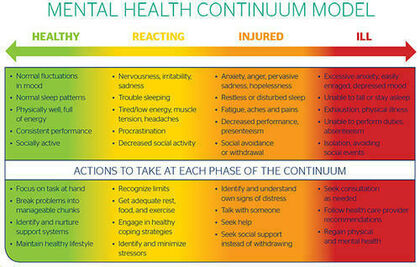Article
Odds Are Your Team is Struggling and Not Telling You
August 17, 2020
One of the greatest things about the high performers we have the pleasure to work with is that when the going gets tough, they get going to find solutions and to capitalize on opportunities — even when they aren’t feeling well or are tired. They almost always find a way to rise up and deliver.
That’s one of the reasons they are appreciated so much.
But the downside of that high-performance mentality is that when it gets really, really, really tough ‑and it will, sooner or later – it’s harder to admit when they need help. Like during this time of COVID-19 when we are seeing record numbers of people who are stressed and strained, and not raising their hands to talk about it.
This article in Forbes magazine about a study on the mental health toll of the pandemic says it all: more than half of the 1000 respondents said they are afraid to tell their bosses or to ask for extra help or some time off when they need it.
At the root of all of it is a fear of repercussions and of looking weak or incapable. The not-so-funny thing is even though a huge portion of people in North America are thinking and feeling the same thing, they feel alone when they have difficulty coping.
That’s no surprise when the culture of many high-performing companies is based on the attributions of high performers who find a way to get things done. In a recent podcast, we talked about how even in the companies that really care for their employees – and despite policies like flex days, and time off to attend their kids’ sports days — it can be difficult to say, “I need a break”.
If Your Team is Struggling Make it Easy to Ask for Help
The best thing you can do — as a manager and a leader, knowing there’s a good chance many people on your team need a break — is to put the conversation on the table, and to share and talk about the Mental Health Continuum Model.

Image Source: BC Emergency Health Services
This is one of the tools we use when we teach companies about mental health issues and their effect on individuals, the culture and bottom line. We also talk about building resilience (Chapter 3, Double Your Resilience, Your Oxygen Mask First), and share examples of our own and others’ experiences.
Be open with your own experiences to de-stigmatize mental health issues in your company. We all get burned out and there are strategies to get back.
It’s important to normalize that stress can be more than we can handle, and the longer we delay getting help and support, the worse it gets. Make sure the people on your team gets the support they need – including time off or help from counsellor or psychologist, if they are in the orange or red zone.
The ultimate challenge to all of us, as leaders, is to be the person people can come to early, so that they can continue to be healthy and productive.
As I recently shared with a CEO who I encouraged to take time off to rejuvenate, if we were a plant denied the water, sunshine and fertilizer needed to thrive, we’d be a wilted version of best selves.
The Challenge
- Check in with your people to understand where they are now, and to make sure they have what they need.
- For yourself, take a look at the Mental Health Continuum model, self-assess and figure out what you need to be at your best.
- If someone on your team is stuck make sure they get the right professional help.
If you’d like someone on our team to come and teach some of the principles of mental health, let us know.
About Lawrence & Co.
Lawrence & Co. is a growth strategy and leadership advisory firm that helps mid-market companies achieve lasting, reliable growth. Our Growth Management System turns 30 years of experience into practical steps that drive clarity, alignment, and performance—so leaders can grow faster, with less friction, and greater confidence.
About Kevin Lawrence
Kevin Lawrence has spent three decades helping companies scale from tens of millions to hundreds of millions in revenue. He works side-by-side with CEOs and leadership teams across North America, the Middle East, Asia, Australia, and Europe, bringing real-world insights from hands-on experience. Kevin is the author of Your Oxygen Mask First, a book of 17 habits to help high-performing leaders grow sustainably while protecting their mental health and resilience. He also contributed to Scaling Up (Rockefeller Habits 2.0). Based in Vancouver, he leads Lawrence & Co, a boutique firm of growth advisors.